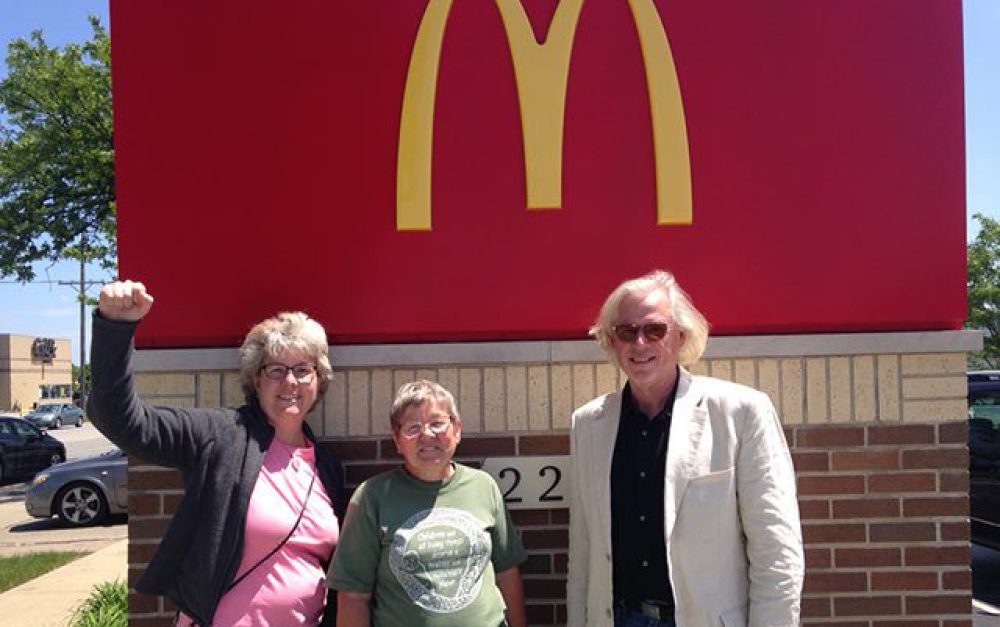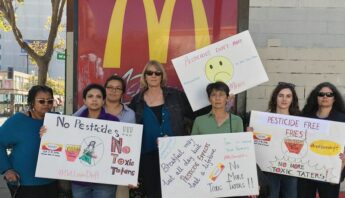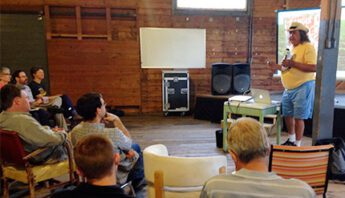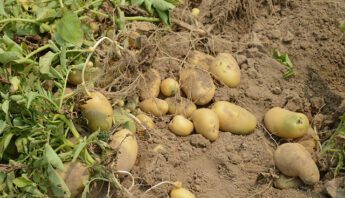Last Friday, I was sitting at a coffee shop thinking about the previous 24 hours — and feeling uncertain about my next steps. I’d just gotten back from the McDonald’s annual shareholder meeting in Chicago, where I had planned to share my concerns about pesticides used to grow potatoes that become McDonald’s french fries.
Though I had mustered up the courage to speak before hundreds of people at the high-profile meeting, the corporation’s security people turned us away.
This trip originated in the pine forests surrounding my small vegetable farm in Sebeka, Minnesota. The forests around us have been managed by a timber company for many, many years. Pine trees would be planted, then thirty or so years later they would be harvested and pines planted again. Then potato production moved in.
Clearing pines to plant potatoes
We live on what is called the Pinelands Aquifer, an area of pure sand with a very thin layer of organic matter on the surface from accumulated pine needles. The water table is shallow, and the pine forest is interspersed with areas of swamp where the water sits on the surface of the land.
Though McDonald’s sent us away, I’ll keep telling my story to anyone who will listen. Together, our voices will be heard.
The most significant aspect of this environment is that sand drains very quickly. That means we are never more than three dry days away from a drought. It also means that anything water soluble — including pesticides — will be quickly washed down through the sand into the groundwater below. That’s the water most of the community drink from their home wells.
Imagine my consternation when heavy equipment moved in beside our farm and began knocking down all the trees. Soon after, the drilling rig arrived — a piece of equipment designed to pump a massive amount of groundwater out of the aquifer to irrigate the new potato fields.
I had no idea what was going on until a neighbor called and asked, “Have you heard?” The forestry company had sold the adjoining land to RD Offutt Company (RDO). Potato growers.
No, let me rephrase that: potato producers. To me, “growing” is a creative action involving intimate knowledge of the soil, the surrounding habitat and the environment. It means increasing biodiversity and people’s health, rather than diminishing them. That’s not how RDO, the largest potato company in the world, produces potatoes.
What does having RDO in town mean for our community? Ask folks living in neighboring Hubbard County who have already had their wells contaminated with nitrates and pesticides. Ask residents of Frazee, or the Pine Point community at the White Earth Reservation, who have detected carcinogenic pesticides in their air.
Or, ask my son what it was like to be wakened every Sunday morning at 7am, when the helicopter flew over his home applying pesticides to the adjoining field.
Taking our message beyond the potato fields
I feel a personal attachment to the land surrounding me even if I cannot claim ownership. A few hundred feet from my yard is where the coyotes’ song taunts my dog. It’s where I go in August to gather bearberry. It’s where the wind passing through the pines sings before it reaches me.
I wanted McDonald’s to see the true cost of their “world famous fries.”
I made the trip to Chicago because of this attachment — and because this issue is important, to all of us. And I know I need to speak now or forever hold my peace.
So when Toxic Taters and PAN asked me to make the trip to Chicago, I got in a car and got on a plane to speak to the people who set the standards for how potatoes are grown. I wanted McDonald’s to see the true cost of their “world famous fries.”
Toxic Taters paid my way and held my hand, with PAN there to support. A few responsible shareholders had donated their proxies to allow us to take their place at the meeting. Yet at the gate we were turned away by McDonald’s security and local police.
Tell McDonald’s: No more toxic ‘taters!
Join rural Minnesota communities in urging McDonald’s grow safe, sustainable potatoes. 
McDonald’s made a mistake when they chose not to listen to our stories from the potato fields. Larry Heitkamp (in photo above) and I are organic farmers, and we know a thing or two about growing food in a way that benefits local communities instead of contaminating them. And though McDonald’s sent us away, we’ll keep telling our story to any that will listen.
Maybe together, we’ll be able to make all of our voices loud enough to be heard.







